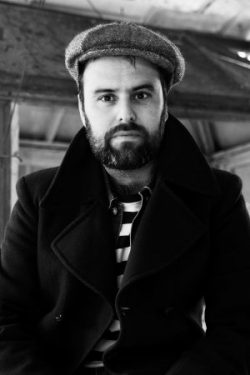Shortlist Spotlight: Benjamin Myers
16th May, 2018
The Gallows Pole by Benjamin Myers was a wonderful new discovery for the Walter Scott Prize judges. Here, he answers some of our questions.
Q: What do you think about being shortlisted for the Walter Scott Prize for Historical Fiction? Do you see yourself as a historical novelist?
I’m surprised, delighted, humbled, and then surprised again. To be amongst such excellent long- and shortlisted literary company both past and present is a huge confidence boost in a profession where many, I suspect, exist in a state of doubt and insecurity. Or I certainly do anyway. I don’t see myself as a historical novelist as I have previously written about the contemporary era and have published in other forms and genres, including non-fiction, crime, landscape writing, poetry and journalism; I’m a jack of all trades and master of none. However I do see my shortlisted novel The Gallows Pole very much as a historical novel and certainly plan to write more books that would be classified as such.
Q: How did the people and times you write about in this novel first lodge in your imagination?
I live slap-bang in the centre of the area in which the real-life events that inspired my novel took place – that is, the misdeeds of a criminal gang known as the Cragg Vale Coiners who forged money and committed murder in and around the Upper Calder Valley in West Yorkshire during the late 18th century. Actually, it all began when my wife returned from visiting the library in the Bowes Museum in County Durham, where she had randomly pulled a history book about the Coiners from the shelf. She thought the story would make an excellent TV series. At the same time the mythology of the area slowly seeped into my consciousness, and the themes of the story – rich versus poor, North versus South, class divide, English national identity – appeared so relevant today that they were difficult to ignore. But I only know how to write novels, so I thought that was the best route into the story.
Q: What role does research have in your writing? When does the fiction take over from the facts?
Research was everything early on – not just the basic facts of the story, but in the smaller details, for example the nuances of regional dialect, the dietary details of characters or in site-specific scenes and the role that landscape played in the story. At some point though an author has to take a leap into the unknown and impress their own ideas onto the story. The main character David Hartley exists in public records, local history, legal documents and so forth, but very little was actually known about his personality, his politics and his philosophy, and that is when artistic license is applied. At that point historical writing, memoir, fiction and – in this case – a twisted sort of poetry all merged into one, and splashes of colour were hopefully added to the grey areas of the shadowed past.
Q: Do you think that writing about the past is important for society?
I think we continually learn from from the past so, yes, it is hugely important. But then again, more broadly, mankind seems to be making the same mistakes over and over again as empires rise and crumble. The world has changed beyond all recognition in the past two or three centuries, yet I‘m not convinced that people have learnt a great deal and so long as many are homeless or without food across the globe, ‘progress’ is a decidedly wonky concept.

